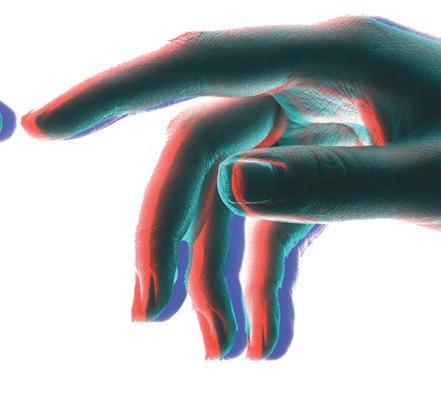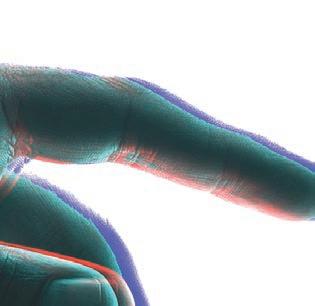
7 minute read
Survivor's
By Claire Roster

Advertisement
Some of the people best placed to help churches to be more intentional about advocating for the biblical equality of women and men are those who have wrestled in the real world with their traditional beliefs and ultimately embraced the principles of biblical equality. What can their journeys teach us about the barriers and facilitators to fostering advocacy? What insights and skills can they offer the church as leaders and advocates for biblical equality?
Change is hard for most if not all of us. We tend to default to the familiar, to what is comfortable, to what is known. It’s never easy to re-examine beliefs that we grew up with, beliefs we learned from our parents, and which many of us then passed on to our own children. It can be difficult to acknowledge that some of those beliefs may have been naive, culturally biased, or maybe even harmful. There is much to learn from women whose spiritual and personal journeys have led them to re-examine their beliefs about the submission of women and the authority of men, and who have come to recognize their God-given worth and agency as equal members of God’s kingdom. For some women, the catalyst of change was their experience as survivors of abuse.
Survivors frequently report that hierarchical teaching within the church emphasizing the authority of men and the submission of women fuelled the abuse they endured, giving their abuser ‘permission’ to continue their abusive behaviour unchecked. Whether they have chosen to leave or to stay in a complementarian church community (and some do), these women have something to say to us on the topic of equality and can offer insights into the paradigm shift that is required for change to happen. Mapping their stories may help us uncover some of the factors that facilitated that shift, as well as some of the barriers that need to be addressed. Examining the key moments in their journeys may help us to identify some of the tools that churches may use to be more intentional and better equipped when advocating for biblical equality.


My own journey towards biblical equality began later in life. After almost twenty years of closing my mind and heart to the truth, I finally acknowledged that my supposedly Christian marriage had been a sham from the start. I come from a traditional, Bible-believing family and church where divorce is not permitted or even discussed. After much wrestling with God, I finally recognized that a loving Father does not call his children to endure ongoing faithlessness and abuse. The shift was seismic in every sense—physically, spiritually, socially, and emotionally, and I continue to live with the consequences of that to this day. My friends tried for years to tell me the truth about what was happening, but I refused to see it or believe it. I thought I was being invincible, resilient, and brave. Even though my beliefs kept me in a prison of intimidation, violence, coercion and control, I continued to believe that my adherence to what I had been taught about God’s view of divorce and the sanctity of marriage would ultimately vindicate me for staying, regardless of the cost to me personally. I was ready to endure for as long as it took, rather than acknowledge the truth that my marriage was already over.
Naming The Truth
The moment everything changed was shattering. After an especially violent incident, I wondered how my life had come to this. How could my belief that marriage was for life—for better and for worse—along with the fear of the social shame and condemnation I would face if I left, have led me to the point where I was literally broken and my children were living in fear?
This was the moment when I finally named the truth Not the truth that I had been used and abused. Not the truth that I was not loved by the person I had married. Not the truth that things were out of control and rapidly spiraling towards disaster. Not the truth that our efforts at reconciliation had been utterly futile. No, the truth I named before God that day was that I had made being married into an idol. It had become more important to me than my own safety or even the safety of my children. Once I realized that God also called me to be a woman and a mother, I understood that protecting myself and my children from harm was more important than holding on to my status as a wife, even if that meant living through a period of social shame and immense personal disruption. That was the truth I had refused to see or believe for so long—but finally, for the first time in my life, I understood what Jesus meant when He said that the truth sets us free.
Empowering Through Community




The next thing that happened was truly beautiful. Amid the profound chaos and disruption of the following weeks and months, a small group of friends came alongside, tenderly carrying my children and me along each step of the new and perplexingly complex road that inevitably follows the breakup of any marriage. They cried with us, cheered us on, and walked with us through every challenge, right down to the smallest detail. Some of those people were disciples of Jesus; others would say they were not especially religious, but all of them were good and kind people who knew we needed their love and support. They gave me the courage to take the necessary steps, challenged me to re-examine my beliefs, and gave me confidence to move towards a different and better future. They gave legs to the truth, as well as the courage to go forward with the hope and confidence that I was not and would not be alone.

be a more submissive wife. I moved to another complementarian church where I thought I would be safe, and for a while, I was. But when I asked about pastoral care for women, the leaders (who, in line with their beliefs, were all male) replied that violence sometimes happens in relationships. Their view was that the government’s definition of abuse could not be trusted (since by those standards, 75 percent of men in the church would be abusing their wives), but that in any case, there were no cases of abuse in their church as far as they knew. This was, paradoxically, the catalyst for the next chapter in my journey, propelling me to take a deep dive into the literature, reviewing and questioning everything I had previously been taught. A few months later,
I moved to an egalitarian church where I was welcomed, valued, respected, and felt safe. There, at last, I was able to piece together the puzzle of my past and finally found my voice.


Survivors of abuse know what it is like for their voice to be silenced. By ignoring the voices of women, refusing to recognize them as equal partners in the kingdom of God or give them a seat at the table so they can participate fully in the life of the community, church leaders perpetuate a culture of silence and shame. Covering up wrongdoing, protecting abusers, and blaming survivors for their traumatic experiences can be all too easy when leaders fear the consequences of the truth being revealed. But for a community to thrive, everyone must honor each other as equals. Church leaders can foster this environment by resisting fear, speaking out against power and control, and actively advocating for equality and respect as essential to our lives in the kingdom of God. No community is perfect. But when leaders speak courageously, it empowers all of us to step out of the shadows and find our voice too.
Advocacy and Life with God




How has my journey shaped my life with God and equipped me to advocate for women’s biblical equality? And what can the church learn from the journeys of survivors?

First, I am learning the importance of lament. Grief is part of the journey for all of us, and it has meant sitting with the sadness, recognizing the losses, and grieving for what will not be. Lament permits us, like the psalmists, to honestly articulate our grief, anger, pain, and sadness to God in prayer. It’s a step that can’t be passed over. Lament is a place where we can invite God to sit with us as we recognize what happened, tune in to our emotions, and ask the hard questions about suffering. We learn that to suffer is human. We may not learn all the answers, but we learn compassion.

Here, hearts are shaped for the rest of the journey.

Second, in facing and overcoming complex personal, emotional, and spiritual challenges, like all survivors, I am developing resilience. By embracing the truth that I am loved and equal before God and by learning to adapt to change, I am cultivating the skills needed to lead both myself and my children to places where we can be safe, strong, and can flourish.
These are precious and deep life skills, as well as spiritual gifts.
I am also learning how to be a better listener and lean into my own heart and the heart of others. I am discovering how to inhabit the gray spaces instead of seeing everything in black and white and to accept that there are moments where the answers to life’s hardest questions may seem unknowable. These life gifts are hugely important within the church today.
In order to grow, we have to dig go down deep with God—it is the work of a lifetime.
There is nothing good about abuse, and even the suggestion that there may be a silver lining to this evil may seem distasteful. But as God offers us life in abundance through Jesus, we discover that He does, curiously, begin to redeem our brokenness. He makes beauty out of ashes. He breathes life into dry bones. In the crucible, resilient, compassionate, and courageous leaders are born. Survivor’s journeys are shaped by life-shifting moments where they find the courage to name the truth of their God-given worth and agency, seek out hope in community, find their voice, and grow from a life in the shadows into strong and resilient leaders. They learn to befriend grief, adapt to complex challenges, and lean into their heart and the hearts of their fellow journeyers with compassion, honesty, and mercy. Their unexpected journeys equip them to inhabit the gray spaces and to go deep down with God to search for truth and hope.
Survivors are exactly the kind of advocates and leaders that the church needs today.







